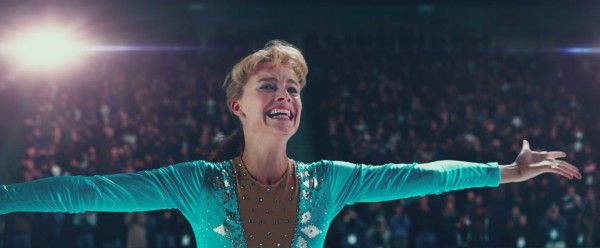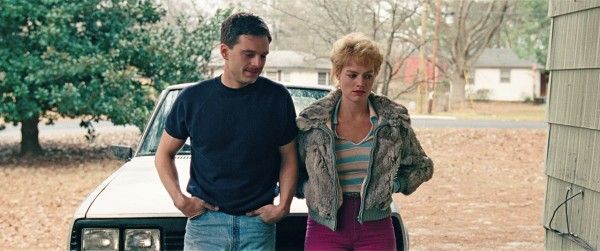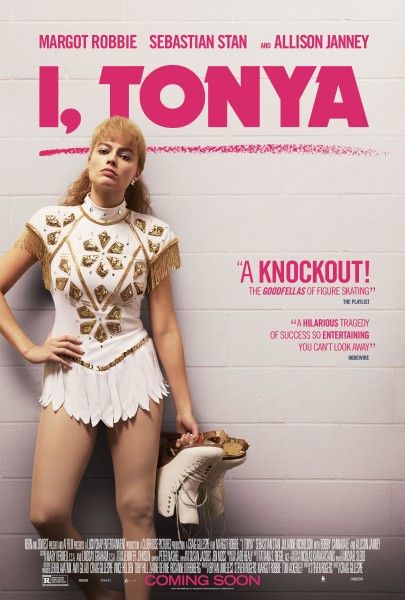[This is a re-post of my review from the 2017 Toronto International Film Festival; I, Tonya opens in limited release on December 8th]
Time may not heal all wounds, but at the very least, it allows us to see them more clearly. In 1994, figure skater Tonya Harding was reduced to a punchline at best and a villain at worst when she was implicated in the kneecapping of rival skater Nancy Kerrigan. Later research, especially the excellent documentary The Price of Gold, have taken steps to bring more nuance and detail to Harding’s story. Craig Gillespie’s I, Tonya continues that work, showing Harding not as some nefarious schemer or selfish brat, but a survivor of abuse, first from her mother, then from her husband, and finally from America. With a wickedly sharp script Steven Rogers and outstanding performances from the lead cast, especially Margot Robbie, I, Tonya rewrites the stale script both of Harding’s legacy and the tragedy-to-triumph sports narrative.
Based on interviews with Harding, and her ex-husband Jeff Gillooly, the narrative takes a fractured approach with various characters chiming in on Harding’s upbringing, her relationship with Gillooly, and finally the incident that made her infamous. However, before rushing to “the incident”, the story carefully shows how Harding (Robbie) had to harden herself against the world due to the abuse she suffered at the hands and words of her mother LaVona (Allison Janney), and later the beatings she took from Gillooly (Sebastian Stan). Abused by the people who were supposed to love her and rejected by the skating community that judged her based on her appearance rather than her ability, we’re forced to laugh at Harding’s story to keep from crying.
Gillespie’s approach can be a bit jarring at times as he unflinchingly shows the physical and mental abuse Harding suffers, but he never wants her to be seen as the victim or turn the story into a PSA. His solution is to over-rely on needledrops and breaking the fourth wall, turning the abuse into something oddly quirky despite never draining it of any of its impact. It’s not that the movie is ever trying to make light of the abuse Harding suffered, but rather that it simply became part and parcel in the growing absurdity of her life. Harding, embittered but never defeated, continues to strive for the things she’ll never get. Her mother will never protect her, her husband will never love her, and the skating community will never respect her, but she keeps trying anyway.
The movie never feels fully comfortable embracing the tragic aspects of Harding’s story (perhaps so that she doesn’t become a figure of pity), so Gillespie seems far happier once he’s able to get into the Coen-eseque twists and turns revolving around the assault on Kerrigan. To be fair, the incident has all the makings of Coen Brothers’ crime story with incompetent goons believing they’re smarter than they are. It also gives way to Paul Walter Hauser’s scene-stealing performance as Shawn Eckhardt, Gillooly’s dimwitted friend who engineered the kneecapping.
But the film really belongs to Robbie, who shows that she will probably end up being revered as one of the greatest actresses of her generation. Although she only really broke out a few years ago with her supporting turn in The Wolf of Wall Street, her performance as Harding is the highlight of her young career. She embraces all of the anger, all the sadness, and all of the disappointment Harding faced. The movie knows that Harding was turned into a joke, and while it certainly pulls the skater away from that shorthand, it thankfully never becomes a hagiography. Robbie’s performance doesn’t ask us to love Harding, but simply to understand and empathize with her, which is a much harder task if you’re going to portray a real human being rather than a myth or a saint.
In its own weird way, I, Tonya functions as the anti-sports story. Rather than telling us about an athlete who overcame adversity, I, Tonya is the tale of an athlete consumed by tragedy and misfortune. History attempted to paint Harding as an evil mastermind when it really looks like she was deprived of control at every turn. It makes for a fascinating portrait that’s electrified by Gillespie’s direction and the outstanding performances (I’d be remiss if I didn’t note Janney’s Oscar-worthy supporting work and Stan’s surprising play against type). Like last year’s The People v O.J. Simpson: American Crime Story, I, Tonya asks us to reconsider what we thought we knew in the 90s and realize that the headlines and the punchlines obscured a darker and more difficult story. I, Tonya may not “redeem” Tonya Harding, but she never asked for redemption. She merely asked for respect, and I, Tonya provides it with biting honesty.
Rating: B+




